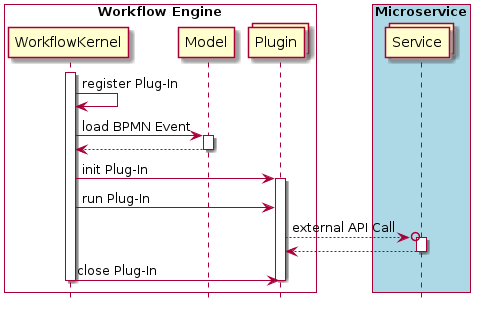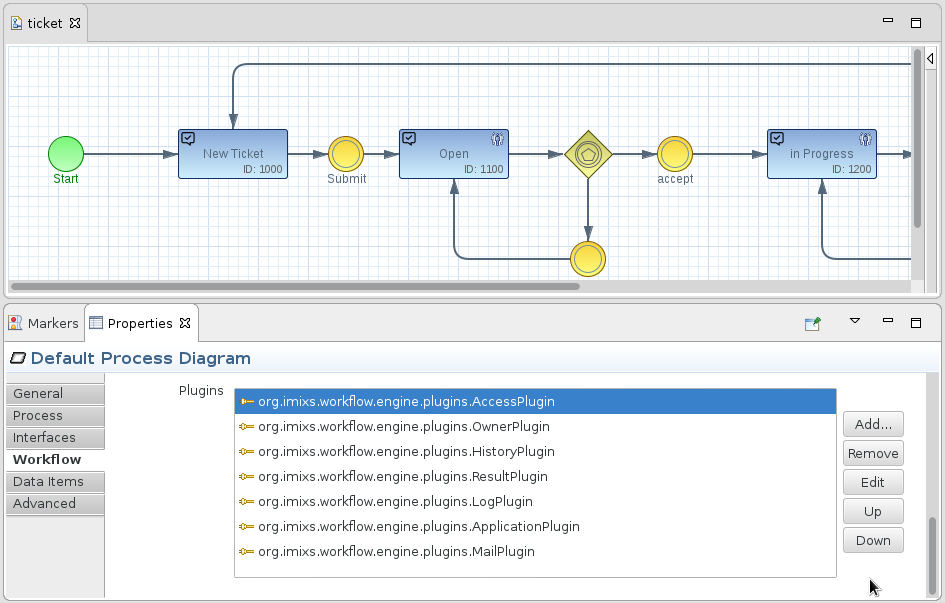Imixs-Workflow Plugin API
The Imixs-Workflow Plugin API provides a microkernel architecture pattern and is the standard extension mechanism of the Imixs-Workflow Engine. The microkernel pattern allows you to add additional features to the Imixs-Workflow engine. The Plugin API is providing extensibility to the processing cycle of a BPMN Event as well as feature separation and isolation.
A Plug-In can be bound to one or many different BPMN models. Each time a BPMN Event is triggered, an associated Plug-In will be executed. In this way a Plug-In extends the processing life-cycle of a BPMN Event. A Plug-In can exchange data or execute platform specific technical functionality. For example a Plug-In can apply a business rule, send an E-Mail notification, or call a Microservice.

The Imixs workflow project already offers a number of Plug-Ins that cover many of the standard features of a workflow engine. You will find an overview in the section Plugin-API. As an alternative extension mechanism see the Imixs Adapter API which is also part of the Imixs microkernel architecture pattern
Adding a Plug-In to a BPMN Model
Plug-Ins are bound to the Imixs-Workflow model and can easily be added to a BPMN model using the Imixs-BPMN modeling tool. The section Workflow in a BPMN model defines the Plug-Ins as well as their execution order:

Read more about modeling in the Imixs-BPMN user guide.
The Plug-In Architecture
Each Plug-In represents an individual building block inside a Imixs-Workflow application. A Plug-In can be reused in different workflow models for different applications. A Plug-In, added to a workflow model, is controlled and executed by the WorkflowKernel. The WorkflowKernel calls the Plug-In during the processing life-cycle and provides information about the running process instance and the workflow event processed by the workflow engine.
This concept makes it easy for a Plug-In Developer to implement additional business logic and custom functionality. A Plug-In can validate a process instance and may also manipulate the business data. A Plug-In can also interrupt the processing phase by throwing a PluginException - for example in case of a validation error.
The Two-Phase Commit
The Imixs Plugin-API defines three call-back methods, called by the WorkflowKernel for each Plug-In in one single transaction during the processing life-cycle. This is the concept of a two-phase commit (2PC).
public void init(WorkflowContext workflowContext) throws PluginException;
public ItemCollection run(ItemCollection document,ItemCollection event) throws PluginException;
public void close(boolean rollbackTransaction) throws PluginException;
After the WorkflowKernel started a new transaction to process a workitem, first the init() method is called for each Plug-In. A Plug-In may setup necessary external resources or can indicate an invalid state by throwing a PluginException.
In the second phase, the WorkflowKernel executes each Plug-In by calling the run() method. The WorkflowKernel provides the current process instance and also the event as parameters for this method. After a Plug-In has executed its internal business logic, it should return the instance of the processed workitem to indicate that the processing life-cycle can be continued. If a Plug-In returns null or throws a PluginException during the run() method, the current transaction will be rolled back by the WorkflowKernel.
In each case, the WorkflowKernel will finish its transaction by calling the call-back method close() for each Plug-In by providing the roll-back-status. In case the transaction will be rolled back, the flag rollbackTransaction will be ‘true’. The close method allows a Plug-In to tear down external resources or roll-back internal transactions. In a concept of a two-phase commit, the WorkflowKernal takes the role of the central coordinator.
Example
The following example shows the general structure of a Plug-In implementation:
public class MyPlugin implements Plugin {
WorkflowContext workflowContext;
public void init(WorkflowContext actx) throws Exception {
workflowContext = actx;
}
public ItemCollection run(ItemCollection workitem, ItemCollection event) throws Exception {
try {
// you business logic goes here....
} catch (Exception e) {
// signal exception....
throw new PluginExeption(e);
}
// signal success
return workitem;
}
public void close(boolean rollbackTransaction) throws Exception {
try {
// restore changes?
if (rollbackTransaction) {
// role back....
} else {
// commit changes....
}
} catch (Exception e) {
}
finally {
// close resources
}
}
}
How to Access the Workflow Model
During the init() phase the WorkflowKernel provides the Plug-In with an instance of the WorkflowContext. The WorkflowContext is an abstraction of the workflow environment and provides access to an instance of the Model interface. The following example illustrates how an instance of a model can be fetched during the initialization of a Plug-In:
public void init(WorkflowContext ctx) throws Exception {
if (ctx instanceof WorkflowService) {
// yes we are running in a WorkflowService EJB
workflowService = (WorkflowService) ctx;
// get model
Model model= workflowService.getModelManager().getModel(aModelVersion).
}
}
Plug-In Dependencies
A Plug-In may optionally implement the interface ‘PluginDependency’ to indicate dependencies on other Plug-Ins. Plug-In dependencies are validated by the WorkflowKernel during processing a workflow event. If a Plug-In defined by the BPMN model signals dependencies which are not reflected by the current model definition, a warning message is logged.
The interface PluginDependency only provide one method called ‘dependsOn’ returning a String array with Plug-Ins need to be called before this Plug-In class can be executed by the WorkflowKernel.
org.imixs.workflow.PluginDependency
See the following example:
public class MyPlugin implements Plugin, PluginDependecy {
public List<String> dependsOn {
String[] depends = new String[] { "org.imixs.workflow.engine.plugins.AccessPlugin", "org.imixs.workflow.engine.plugins.RulePlugin" };
return Arrays.asList(depends);
}
